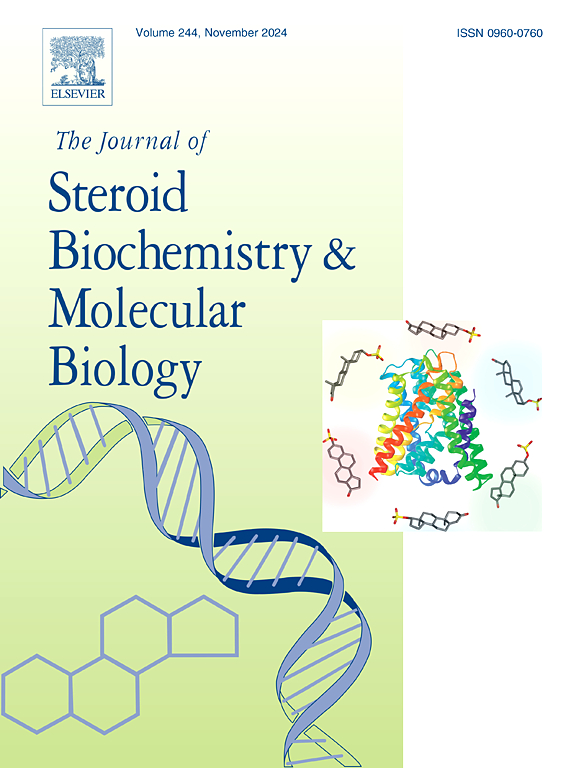Effect of calcitriol on myeloid-derived suppressor cells in physiological aging
IF 2.7
2区 生物学
Q3 BIOCHEMISTRY & MOLECULAR BIOLOGY
Journal of Steroid Biochemistry and Molecular Biology
Pub Date : 2025-04-30
DOI:10.1016/j.jsbmb.2025.106768
引用次数: 0
Abstract
The active hormonal form of vitamin D, 1,25(OH)2D, regulates many components of the immune system and previous research shows that 1,25(OH)2D reduces the number and suppressive activity of MDSCs in tumors. This study aimed to evaluate the effects of calcitriol treatment on MDSCs in aged mice. We showed that aged BALB/c and CD1 mice exhibited increased levels of CD11b+Gr1+ cells in both the spleen and bone marrow compared to young mice. These cells displayed a less mature phenotype marked by reduced F4/80 expression and demonstrated robust T cell suppressive activity, as evidenced by their ability to inhibit the production of IFNγ and TNFα. Treatment of aged mice with calcitriol, administered twice weekly at a dose equivalent to 1 µg/kg for 4 weeks, significantly increased the population of CD11b+Gr1+ cells in the spleen, but not in the bone marrow of the animals, and promoted their differentiation into a more mature phenotype characterized by elevated F4/80 expression. In addition, calcitriol-treated aged mice exhibited significantly improved T cell responses, as indicated by increased IFNγ production upon specific antigen stimulation compared to the control group of mice. In vitro, calcitriol treatment of bone marrow-derived MDSCs similarly enhanced F4/80 expression without altering other markers such as CD11b, CD11c, or MHCII, and led to reduced expression of reactive oxygen species by these cells. Our study highlights the consistency of MDSC expansion across inbred and outbred mouse strains and supports the immunomodulatory role of calcitriol in promoting MDSC maturation and alleviating immune suppression in aging.
骨化三醇对生理性衰老中髓源性抑制细胞的影响
维生素D的活性激素形式,1,25(OH)2D,调节免疫系统的许多成分,先前的研究表明,1,25(OH)2D减少肿瘤中MDSCs的数量和抑制活性。本研究旨在评价骨化三醇处理对老年小鼠MDSCs的影响。我们发现,与年轻小鼠相比,衰老的BALB/c和CD1小鼠脾脏和骨髓中的CD11b+Gr1+细胞水平均有所增加。这些细胞表现出较不成熟的表型,F4/80表达减少,并表现出强大的T细胞抑制活性,这可以通过它们抑制IFNγ和TNFα的产生来证明。用骨化三醇治疗老年小鼠,每周两次,剂量相当于1 µg/kg,持续4周,显著增加了小鼠脾脏中CD11b+Gr1+细胞的数量,但在动物的骨髓中没有,并促进它们向更成熟的表型分化,其特征是F4/80表达升高。此外,与对照组小鼠相比,骨化三醇处理的老年小鼠表现出显著改善的T细胞反应,这表明在特定抗原刺激下IFNγ的产生增加。在体外,骨化三醇处理骨髓来源的MDSCs类似地增强了F4/80的表达,而不改变其他标志物,如CD11b、CD11c或MHCII,并导致这些细胞活性氧的表达减少。我们的研究强调了MDSC在近交系和远交系小鼠中扩展的一致性,并支持骨化三醇在促进MDSC成熟和减轻衰老免疫抑制中的免疫调节作用。
本文章由计算机程序翻译,如有差异,请以英文原文为准。
求助全文
约1分钟内获得全文
求助全文
来源期刊
CiteScore
8.60
自引率
2.40%
发文量
113
审稿时长
46 days
期刊介绍:
The Journal of Steroid Biochemistry and Molecular Biology is devoted to new experimental and theoretical developments in areas related to steroids including vitamin D, lipids and their metabolomics. The Journal publishes a variety of contributions, including original articles, general and focused reviews, and rapid communications (brief articles of particular interest and clear novelty). Selected cutting-edge topics will be addressed in Special Issues managed by Guest Editors. Special Issues will contain both commissioned reviews and original research papers to provide comprehensive coverage of specific topics, and all submissions will undergo rigorous peer-review prior to publication.

 求助内容:
求助内容: 应助结果提醒方式:
应助结果提醒方式:


